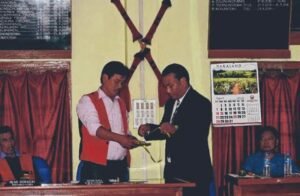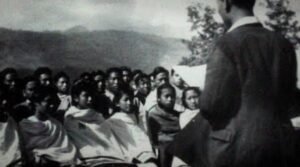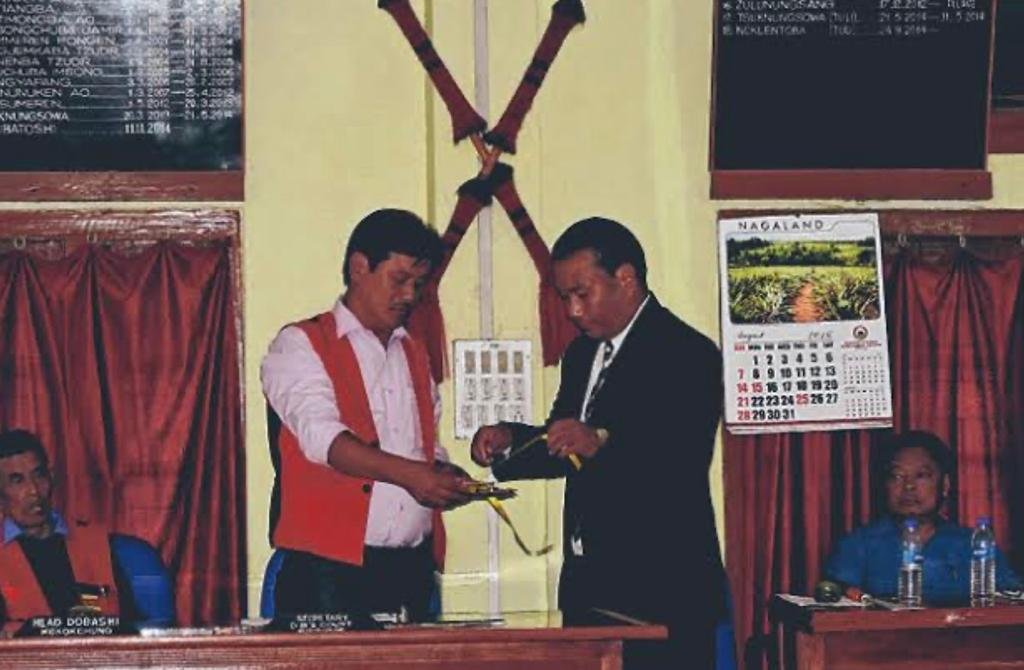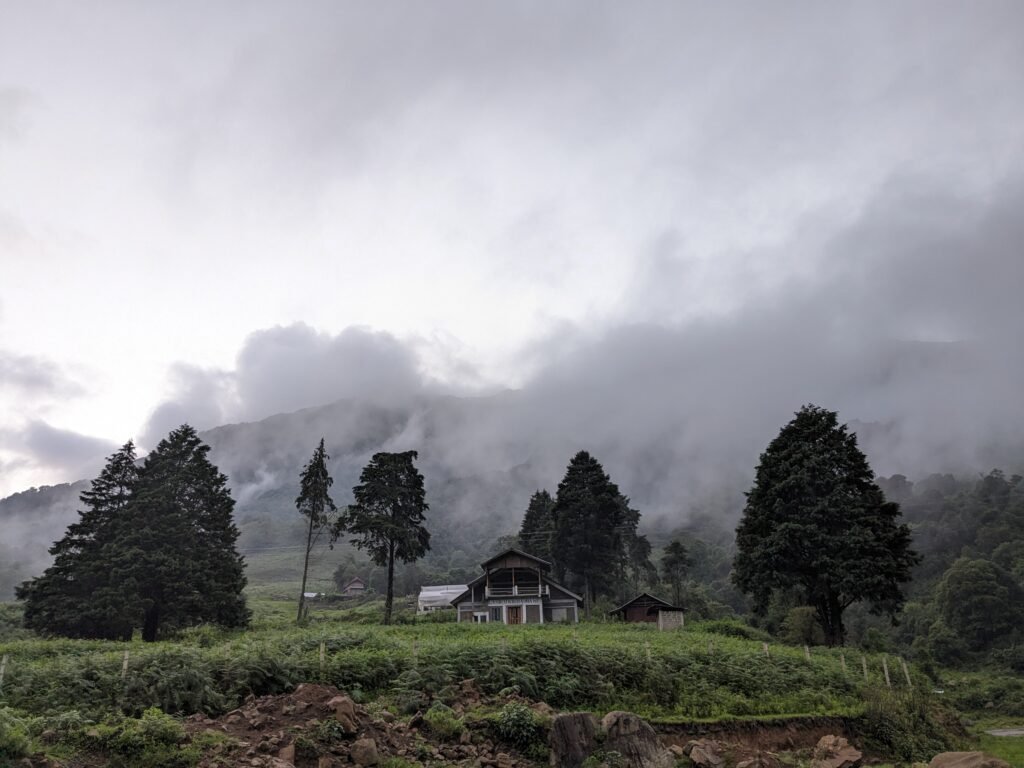One of the most unique aspects that defines the Naga society is its customary law and practices, passed down through generations. These customary laws hold great significance in the lives of the Naga people, governing various aspects of their social, economic, and cultural existence. Despite the influence of modern legal systems, Nagaland’s customary law remains deeply rooted in the community, reflecting the Naga’s profound respect for their heritage and customs.
Origin and Development of Nagaland Customary Law

Image: Release of Ao Customary Law Book
The origin and development of Nagaland customary law can be traced back to the ancient history of the Naga tribes. Nagaland, inhabited by various Naga tribes, has a long tradition of oral societies where knowledge, customs, and practices were transmitted through stories, songs, and folklore. These customs formed the foundation of their societal structure, and the elders and community leaders played a central role in upholding and passing down these traditions to successive generations.
- Tribal Traditions: Each Naga tribe had its distinct set of customs, norms, and practices governing various life aspects. These traditions were deeply ingrained in their way of living, and preserving these customs was considered essential to maintaining the unity and identity of the tribe.
- Communal Living: The Nagas followed a strong sense of community living, where the welfare of the entire tribe took precedence over individual interests. This communal ethos formed customary law’s basis, emphasising the community’s collective well-being.
- Oral Transmission: As an oral society, the Naga tribes relied heavily on oral traditions to pass down knowledge, history, and customs. Elders, known for their wisdom and experience, played a crucial role in narrating the stories and maintaining the continuity of their culture.
- Village Councils: The village was the fundamental unit of Naga society, and village councils were the primary governing bodies. These councils comprised respected elders and leaders from the community who were well-versed in the customary laws. They acted as custodians of the tradition, administering justice, resolving disputes, and maintaining social order.
- Adapting to Changing Times: Over time, as the Naga tribes encountered various historical, social, and political changes, the customary law evolved and adapted. New customs emerged to address emerging issues, and some traditions were modified to align with the shifting dynamics of their society.

- Influence of Religion: The introduction of Christianity to Nagaland in the late 19th and early 20th centuries significantly impacted customary law. Many Naga tribes adopted Christianity, and elements of the traditional customs were integrated into the Christian practices, creating a unique blend of beliefs and rituals.
- Colonial Influence: During British colonial rule, efforts were made to codify and formalise the customary laws of various Naga tribes. These codifications aimed to create a system of governance that combined aspects of tribal customs with the British administration.
- Post-Independence Scenario: After India’s independence in 1947, the region of Nagaland faced numerous challenges related to its integration into the Indian nation-state. The Nagas’ struggle for autonomy and recognition of their unique identity led to political and legal negotiations that sometimes clashed with customary law.
In modern times, Nagaland’s customary law exists parallel to the statutory legal system established by the Indian government. The Indian legal system recognises and acknowledges the significance of customary law in matters related to personal laws, land ownership, and certain aspects of governance within tribal areas. However, challenges persist as customary law encounters various legal and societal complexities, such as conflicts with statutory laws and the need to reconcile traditional practices with contemporary human rights principles.
Despite these challenges, Nagaland’s customary law remains deeply ingrained in the hearts and minds of the Naga people. It continues to serve as a significant aspect of their cultural identity and heritage, connecting them to their ancestral roots and preserving the essence of their unique way of life. As the Naga society continues to evolve, the customary law will undoubtedly continue to adapt and find its place in the modern world while upholding the spirit of Naga tradition and unity.
Key Features of Nagaland Customary Law

- Village Councils: The village is the basic unit of Naga society, and village councils play a pivotal role in administering customary law. These councils consist of respected elders and leaders well-versed in traditional customs. They act as a forum for dispute resolution and maintaining social harmony.
- Dispute Resolution: The customary law places significant emphasis on reconciliation and consensus-building. Disputes are often resolved through discussions within the village council, focusing on restoring peace and harmony rather than imposing punitive measures.
- Land and Property Rights: Land is regarded as communal property, and customary law governs its allocation and inheritance. The system ensures that land remains within the community and is protected from outsiders.
- Marriage and Family: Marriage in Naga society is a sacred institution, and the customary law guides the rules and rituals surrounding marriage. It defines spouses’ rights and responsibilities and addresses divorce and remarriage.
- Festivals and Celebrations: Nagaland’s festivals are deeply rooted in the customary practices of the various tribes. These celebrations are essential to Naga identity and provide a platform to showcase their distinct traditions to the world.
Challenges and Adaptations

While Nagaland’s customary law has survived the test of time, it faces challenges in the modern era. One major challenge is the clash with statutory laws introduced by the Indian government. Modern legal systems often conflict with traditional practices, leading to ambiguity and confusion in legal matters.
Additionally, as Naga society becomes more interconnected with the outside world, there is a concern that younger generations may drift away from their cultural heritage, thereby weakening customary practices. As a result, there have been efforts by community leaders and organisations to promote awareness of and adherence to customary law.
Furthermore, the rise of social issues such as gender equality and human rights presents a complex scenario for customary law. While some customs may seem discriminatory or outdated from a modern perspective, they hold deep-rooted meanings for the Naga people. Striking a balance between preserving their customs and addressing the evolving needs of their society is an ongoing challenge.
Nagaland’s customary law and practices are a testament to the Naga people’s commitment to preserving their cultural identity and heritage. Despite the pressures of modernity and changes brought about by the outside world, the Nagas have held onto their customs, adapting them to contemporary needs while maintaining the essence of their traditions. As Nagaland moves forward, it is vital to find a delicate balance between embracing progress and safeguarding the customs that define the essence of Naga culture. Recognising and respecting Nagaland’s customary law remain pivotal in nurturing this beautiful land’s uniqueness and its people’s uniqueness.




